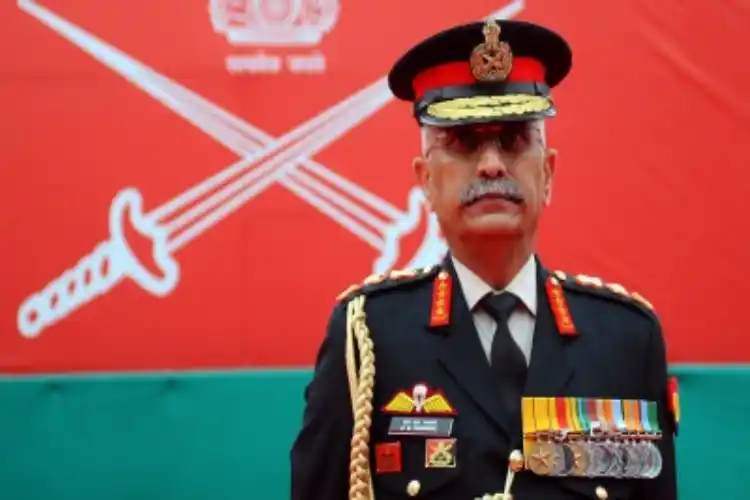
New Delhi
India is already facing trailers of future wars and it is being witnessed in information battlefield, cyberspace, and unsettled and active borders, Indian Army chief General Manoj Mukund Naravane said on Thursday pointing out challenges from China and Pakistan.
Speaking at Pragyan Conclave at the Centre for Land Warfare Studies in Delhi about future wars, Gen Naravne said, "We are already witnessing 'trailers' of future conflicts. They are being enacted daily on the information battlefield, in the networks, and in cyberspace. They are also being played along, our yet unsettled and active borders."
He said that It is for us to 'visualise', the battlefield contours of tomorrow, based on these 'trailers'.
"If you look around, you will realise that the 'sci-fi' of yesterday, is the 'reality' of today," said General Naravane. "We too have to 'leap-frog' to the future, skipping many stages, to an entirely new configuration."
He said the paradigm shift in warfare is well acknowledged. "We are witnessing conflicts increasingly transcending, time, space and force dimensions, and enveloping new frontiers," General Naravane said.
These wars blur the distinction between combatants and non-combatants, front and rear as the adversaries often avoid direct military engagements and resort to extensive use of proxy actors.
There are ongoing hostilities between States, in the cyber, information, sub-conventional, and hybrid domains, without a formal pronouncement of war.
The aim remains to incapacitate the adversary, disintegrate his sources of power, and render the command and control systems ineffective, so as to make physical forces redundant, he said.
He pointed out that India has also observed, some nations challenging the globally accepted norms, and the rules-based order. "This challenge has manifested in various forms of, creeping aggression and opportunist actions, to alter the status quo, keeping the threshold below an all-out war," he said.
Talking about developments in Afghanistan, General Naravane said the situation in Afghanistan has again brought to focus, the use of proxies and non-State actors to decisive effects.
"These actors thrive on local conditions, innovatively exploit low-cost options, to devastating impact and create conditions, that limit the full use of sophisticated capabilities, available to the State," he said.
The concept of sequential, and often graduated application of force, has also undergone significant changes.
"I have said this in the past, and I wish to reiterate, that in future conflicts, the troops, on the forward-most locations, ready and in a high state of alertness, may not be the ones to face the first wave of aggression," he said.
The army chief stressed that military doctrines and concepts have struggled to keep pace with this change and stay relevant.
"The military lexicon has expanded, and traditional definitions have undergone a review. The concept of victory itself has changed, as enduring success, especially against non-state actors, has remained elusive for most," General Naravane said.
"However, if we go back in time, we would realise that even though there have been transformative changes, in the way wars have been fought over time, the nature of war in terms of force and violence, blood and gore, has not changed."
"Why do I mention this? Because sometimes in our zeal to look at the future, we forget the lessons that the past brings to us. These defining constituents, force, and violence have only manifested in newer forms."
He reasoned that hard power has always been relevant, and will continue to play an important part in the future, albeit in new ways, adapting to the changing strategic context.
"This is also one of the reasons, why our ancient Indian wisdom on statecraft, and application of force, propounded many centuries ago, remains timeless and pertinent even today," General Naravane said.
In the present context, he said the ceasefire on the Line of Control continues to hold because India has negotiated from a position of strength.
Talking about the situation at the border with China, General Naravane said, "The developments on our Northern Borders, have also adequately underscored, the requirement of ready and capable forces, with an optimal component of boots on the ground, backed by modern technology, to preserve our sovereignty and integrity."
He says any discussion on Future Contours of War, will have an overbearing tilt towards modern technologies. This is obvious because almost all modern technology tools have the potential for military application and disruptive impact on modern-day warfare.
"This change is already making traditional core competencies irrelevant, and creating the necessity of acquiring new proficiencies," he said.
